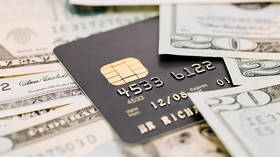US credit card debt tops $1 trillion – report

Credit card balances in the US rose by $45 billion in the second quarter, surpassing $1 trillion for the first time ever, the New York Federal Reserve Bank reported on Tuesday.
Delinquency rates have now returned to pre-Covid levels, the bank’s economists said, noting that the two most recent quarters “appear to show some stabilization.”
Other balances, which include retail credit cards and other consumer loans, as well as auto loans increased by $15 billion and $20 billion, respectively.
The quarterly report shows that student loan balances fell by $35 billion to reach $1.57 trillion, while mortgage balances were largely unchanged at $12.01 trillion.
Total household debt jumped by $16 billion to $17.06 trillion in the second quarter of 2023.
“Despite the many headwinds American consumers have faced over the last year – higher interest rates, post-pandemic inflationary pressures, and the recent banking failures – there is little evidence of widespread financial distress for consumers,” the researchers wrote.
A separate report from the US Federal Reserve indicated that the interest rate for credit cards hit a record 22.2% in May. More than 70 million new credit card accounts have been opened since the start of the coronavirus pandemic, Fed data shows.
Financial experts believe the debt will keep piling up in part because high inflation has been forcing households to lean more heavily on their credit cards to cover expenses.
For more stories on economy & finance visit RT's business section












